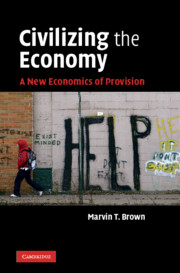Book contents
- Frontmatter
- Contents
- List of figures
- List of tables
- Preface
- 1 Introduction: creating a just and sustainable economy
- Part I Creating a new economic framework
- Part II The civic option
- Part III A civic view of labor, land, and money
- Part IV Civilizing economic systems
- Part V A civic agenda
- 16 The civic obligations of corporations
- 17 Creating circumstances for civic conversations
- Appendix: Free enterprise and the economics of slavery
- Bibliography
- Index
17 - Creating circumstances for civic conversations
Published online by Cambridge University Press: 05 June 2012
- Frontmatter
- Contents
- List of figures
- List of tables
- Preface
- 1 Introduction: creating a just and sustainable economy
- Part I Creating a new economic framework
- Part II The civic option
- Part III A civic view of labor, land, and money
- Part IV Civilizing economic systems
- Part V A civic agenda
- 16 The civic obligations of corporations
- 17 Creating circumstances for civic conversations
- Appendix: Free enterprise and the economics of slavery
- Bibliography
- Index
Summary
At the core of the economics of provision – the practice of providing, protecting, and creating purpose for our families and communities – is the engagement in civic conversations. So far, we have assumed that such conversations are possible. In a sense, we know they are because we have participated in them. Still, in some places they would be out of place because the context would not be appropriate. In some circumstances, civic conversations might be easy but without much consequence. In other circumstances, they may be very difficult to start, but could effect great change. This chapter examines how we might alter difficult circumstances so that civic conversations not only happen but also make a difference.
Back in the 1990s, a small group of people on our street organized a block party. We did the usual preparation: obtained a permit from the city, borrowed the city's barriers for the afternoon, put flyers in mailboxes and so on. More than sixty people came to the afternoon event. Not only has the event continued on a yearly basis, it has also spurred us to hold irregular soup nights, establish a list serve, raise money for earthquake preparations, and have a monthly coffee hour on Saturday mornings at the local café. Our conversations include topics such as how people are doing on the street and how safe people feel living here, as well as local, national, and international events.
- Type
- Chapter
- Information
- Civilizing the EconomyA New Economics of Provision, pp. 222 - 234Publisher: Cambridge University PressPrint publication year: 2010



